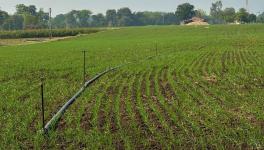Ukraine's Economy is More Than Just Wheat and Commodities
Its fertile black soil makes Ukraine attractive to agricultural producers and investors
Ukraine is one of the biggest countries in Europe, with a size of some 600,000 square kilometers (231,000 square miles) and a population of about 40 million. After it won independence from the former Soviet Union some 30 years ago, the country has been veering between economic and financial crises virtually all the time.
During the 2008/2009 global financial crisis, Ukraine could only be rescued from state bankruptcy with the help of a multibillion-dollar financial lifeline provided by the International Monetary Fund (IMF).
The economic upheavals following Russia's 2014 annexation of the Crimean peninsula and the cessation of the self-proclaimed People's Republics of Donetsk and Luhansk in Russian-speaking eastern Ukraine again brought the country to the brink of economic collapse. Once more, the IMF jumped to Kyiv's rescue offering fresh credit in exchange for tough economic reforms. The strategy worked, at least until Russia attacked the nation in February this year.
Stuck on the road to recovery
The structural reforms imposed by the IMF over the past five years managed to bring down Ukraine's sovereign debt from more than a 100% of gross domestic product (GDP) to just over 50% in 2020.
Following a brief recession that year caused by the COVID-19 pandemic, Ukraine was back on the road to economic recovery with a growth rate of 3.2% last year. Annual GDP per capita reached $3,653 (€3,325) in 2020. By comparison, that of Russia is about $10,037, while Germany's stands at $45,733.
The most important sector in Ukraine's economy is agriculture. Dubbed Europe's bread basket, the country is the world's biggest exporter of wheat due to its vast swathes of fertile soil that make up about a third of all arable land in Europe.
![]()
Grain and commodities
The second-most-important sector is mineral commodities. According to the Germany Trade & Invest (GTAI) foreign trade lobby group, the sector's health is, however, strongly dependent on global market developments in steel, for example. Moreover, the GTAI said in a report published last fall the need for foreign investment in the commodities' sector was huge already before the war.
In recent years, light industries and suppliers have become increasingly important thanks to Ukraine's comparatively low wages and its location close to the markets of the European Union.
Especially European automakers have made some investments in Ukraine in recent years, although the GTAI report noted that the country's manufacturers were still only loosely integrated in the industry's global supply chain.
Nevertheless, the current war has led to severe production disruptions among Europe's carmakers because Ukrainian deliveries of important parts such as cable harnesses have come to a standstill.
Black Sea port of Odessa a crucial hub
An essential hub for Ukraine's economy is the Odesa Marine Trade Port (OMTP), one of the biggest deep-water ports along the Black Sea coast. OMTP is capable of handling 40 million metric tons of bulk cargo and 25 million tons of liquid cargo annually. The port has ceased operations due to the war, though.
Conquering the idled Black Sea port of Odesa is a main objective of the Russian's military campaign against Ukraine
German company Hamburger Hafen und Logistik AG (HHLA) operates a container terminal in the Odesa port and shipped 300,000 twenty-foot equivalent unit (TEU) containers from there last year.
"Odesa is Ukraine's biggest sea port. It's become even more important for seaborne supplies since trade routes via Crimea and the Sea of Azov have turned difficult to navigate," Philip Sweens, a senior HHLA executive, told DW.
Domestic consumption and foreign trade
Private domestic consumption has become a main pillar of economic growth in Ukraine. Rising local wages and remittances from Ukrainians working abroad have been boosting retail sales in recent years.
In addition, the information technology (IT) sector is flourishing on the back of growing numbers of students graduating from universities and colleges. Jobs in the transportation sector have also increased.
As far as foreign trade is concerned, the European Union is Ukraine's most important partner taking in about 40% of all of the country's shipments abroad. German online news portal Tagesschau.de wrote in mid-February that Brussels saw "huge potential" in expanding bilateral trade with Kyiv in the medium and long term. Out of a group of 30 minerals deemed critical for the future by the EU, Ukraine had at least 21, the portal said.
"The EU is interested in building a mineral and [electric vehicle] battery alliance with Ukraine," the report said, adding there was also an option to turn Ukraine into a supplier of hydrogen for Europe.
This article was originally published in German.
Get the latest reports & analysis with people's perspective on Protests, movements & deep analytical videos, discussions of the current affairs in your Telegram app. Subscribe to NewsClick's Telegram channel & get Real-Time updates on stories, as they get published on our website.

























